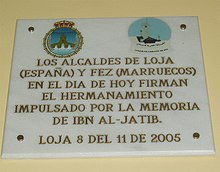
Back لسان الدين بن الخطيب Arabic ابن الخطيب ARZ Ibn al-Khatib Catalan Ibn al-Chaṭīb German Ibn al-Jatib Spanish لسانالدین خطیب Persian Ibn al-Khatib Finnish Ibn al-Khatib French Ibnu al-Khatib ID Ibn al-Khatib Italian
Ibn al-Khatib | |
|---|---|
ابن الخطيب | |
 An inscription in the Court of the Myrtles of the Alhambra, where poetry by Ibn al-Khatib is inscribed.[1] | |
| Born | November 16, 1313 Rajab 26 713 AH |
| Died | 1374 AD, 776 AH |
| Cause of death | Strangulation |
| Resting place | Bab Mahruq 34°03′45″N 4°59′9.8″W / 34.06250°N 4.986056°W |
| Alma mater | Madrasa Yusufiyya |
| Occupation(s) | Poet, historian, statesman, physician |
| Era | Islamic golden age |

Lisan ad-Din Ibn al-Khatib[note 1] (Arabic: لسان الدين ابن الخطيب; 16 November 1313 – 1374) was an Arab[3] Andalusi polymath,[4] poet, writer, historian, philosopher, physician and politician from Emirate of Granada.[5] Being one of the most notable poets from Granada, his poems decorate the walls of the palace of Alhambra. He is known for composing the muwashshaḥāt "Jadaka al-Ghaithu" and "Lamma Bada Yatathanna."

Ibn Al-Khatib is highly esteemed both as a historian and as a poet. He was a contemporary and acquaintance of Ibn Khaldun.[6]
His most significant historical work, The Complete Source on the History of Granada (الإحاطة في أخبار غرناطة),[7][8] written in 1369 AD, which includes his autobiography, has yet to be translated into English.
- ^ "Travelers of Al-Andalus, Part VI: The Double Lives of Ibn al-Khatib - AramcoWorld". www.aramcoworld.com. Retrieved 2021-04-21.
- ^ Antonio Santo Orcero, Ibn al-Jatib, Diverso Variable, p. 5. Undated. Accessed online 2010-01-24. "al-Jatib" is the Spanish transliteration of "al-Khatib".
- ^ Farhad Daftary, The Assassin Legends: Myths of the Isma'ilis, (I.B.Tauris, 1994), 160.
- ^ Alexander Knysh, Ibn 'Arabi in the Later Islamic Tradition, SUNY Press (1999), p. 172
- ^ Encyclopedia of Medieval Iberia, ed. Michael Gerli. (New York: Routledge, 2003), 416–417
- ^ Cite error: The named reference
:2was invoked but never defined (see the help page). - ^ ed. Muhammad Abd Allah Inan (Cairo: Maktabat al-Khanji, 1978)
- ^ "الإحاطة في أخبار غرناطة - المجلد الأول" – via Internet Archive.
Cite error: There are <ref group=note> tags on this page, but the references will not show without a {{reflist|group=note}} template (see the help page).